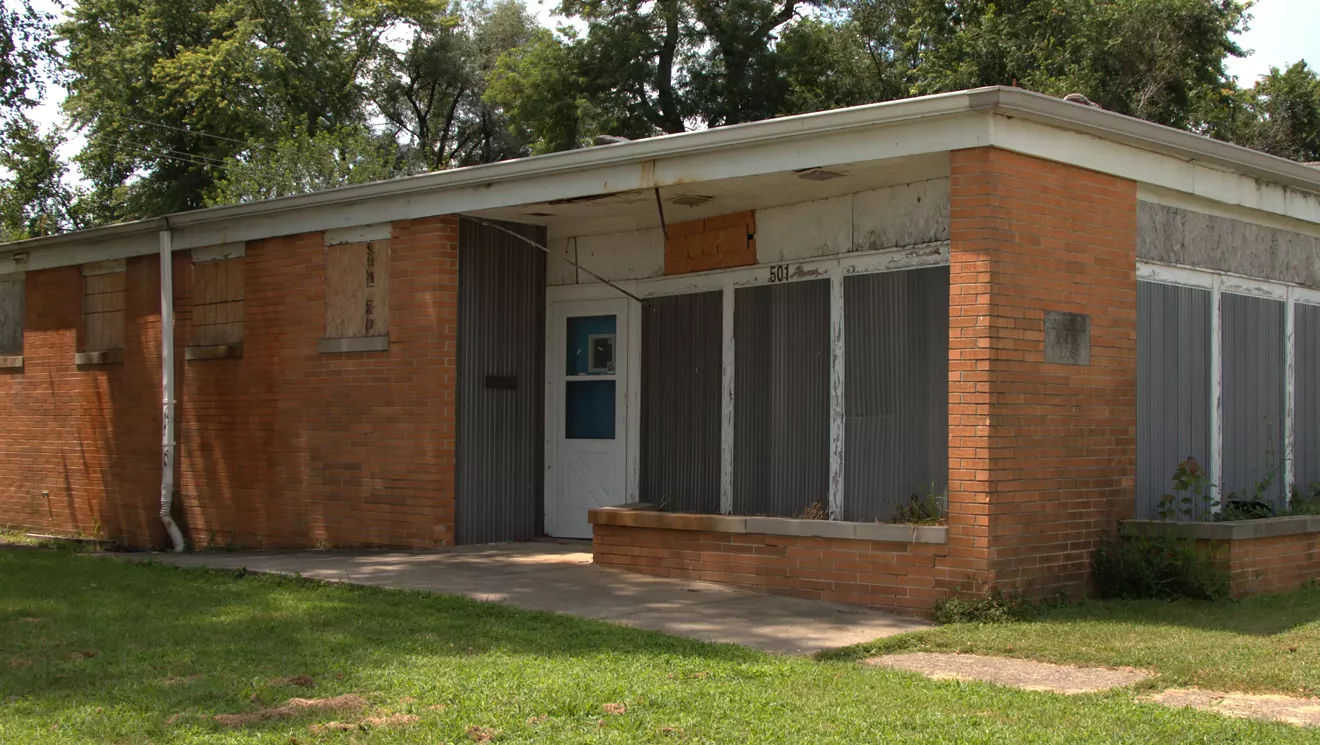
PHOTO BY DEAN OLSEN
Renovations to this building at 501 S. 13th St. in Springfield, once the office of the late Dr. Edwin Lee, a pioneering Black physician on the east side, could be assisted with a proposed $100,000 grant funded with Springfield’s share of sales-tax revenues from the sale of adult-use cannabis.
Former Ward 2 Ald. Frank McNeil, lead plaintiff in a federal court case that resulted in Springfield switching to the aldermanic form of government in 1987 and electing its first Black members of the City Council, wants to restore the city’s first Black-owned doctor’s office.
“I look at this as a community enrichment project,” McNeil, a retired Illinois Department of Transportation administrator, told Illinois Times. “There is a movement in this country to erase history. This is history we don’t need to lose.”
A $100,000 grant from the city’s cannabis grant program, approved by the City Council at its Aug. 6 meeting, would help fund what McNeil estimated will be a $400,000 to $500,000 project to renovate the former office of Dr. Edwin Lee at 501 S. 13th St.
The council voted to authorize the city to work out agreements with McNeil’s business, Dr. Edwin Lee Historical Building Inc., and four other minority-owned east side businesses that could receive $406,000 in total grants.
The council also approved potential allocations of $165,073 in home-improvement grants funded by cannabis sales-tax proceeds for eight east side homeowners, contingent on final agreements with the residents.
This is the third round of grants from the city’s share of sales taxes on adult-use cannabis sales that began in January 2020. The first round in the city’s Cannabis Business Grant program took place in 2022 under the administration of former mayor Jim Langfelder.
The current mayor, Misty Buscher, defeated Langfelder in his bid for a third consecutive term in April 2023. Buscher paused the grant program to fix problems that she said caused it to operate “haphazardly.”
A September 2023 audit paid for by the city pointed out numerous inconsistencies in the program and suggested reforms, many of which were adopted.
A second round of grant awards took place in September 2024. Applications for a fourth round will be accepted in February 2025, Ward 2 Ald. Shawn Gregory said.
Springfield’s business grant program, unique in Illinois when it began, resulted from a City Council decision to devote half of the city’s 3% sales-tax revenue from cannabis sales to help pay off the city’s fire and police pension-related debt.
The council decided to devote the other half to economic development on the east side, specifically for an area that officials said was adversely affected by the nation’s failed “war on drugs.”
Homes and eligible minority-owned businesses must be in the Cannabis Occupation Tax Area, which is bounded by Carpenter Street on the north, Ash Street on the south, Dirksen Parkway on the east and the 10th Street rail corridor on the west, and the business owners must live in Springfield.
The city receives about $1.5 million in local sales-tax revenue from Springfield cannabis dispensaries each year, Gregory said.
The other four businesses in line for cannabis grants in the third round are:
*Community Dollar LLC, 1210 E. Laurel St., which plans to use a potential $100,000 grant for equipment, inventory, parking lot improvements and roof repairs. Business owner Giovonni Thomas said his business handles wholesale, retail and liquidation sales to provide more affordable goods to residents.
*B. Hayes & Tackle Inc., 422 S. 11th St., a bait shop that plans to use a potential $44,000 grant for roof repairs.
*Pride Tint, 1431 S. 11th St., an auto detailing shop that plans to use its potential $62,000 grant for new construction or renovations, the installation of a garage door and windows, painting, lighting and equipment-related costs.
*Springfield Urban League, 100 N. 11th St., a longtime local nonprofit that plans to use its potential $100,000 grant for new construction or renovation involving siding, windows and painting.
Gregory, who was critical of the way the 2023 audit was conducted, said the cannabis grant program has helped many struggling Black business owners maintain and expand their operations.
Gregory said he would like to see the grant money awarded more quickly, but he has been happy with the attitude of officials in the city’s Office of Planning and Economic Development who he said are working to help the program succeed.
When it comes to the former office of Dr. Edwin Lee, a pioneering Black physician and Mississippi native who began practicing in Springfield in 1949, retired in 1993 and died that same year at age 79, McNeil wants the vacant building to showcase Lee’s legacy and reopen as a neighborhood hub for medical services.
McNeil purchased the 4,500-square-foot building for $20,000 in 2024, according to Sangamon County property records. He said he has spent $40,000 or more on the building so far to restore electricity, install a sump pump and make other basic improvements.
But McNeil said, “The whole interior has to be redone. … It’s got to be a ‘gut-and-redo.’”

PHOTO BY DEAN OLSEN
This plaque, on the north side of a brick building at the southwest corner of South 13th Street and East Jackson Street, commemorates the structure as the former office of the late Dr. Edwin Lee, a pioneering Black physician who practiced in Springfield from 1949 to 1993. The building opened in 1958.
Needed improvements to the 67-year-old building, which has two levels – the first floor and basement – include the plumbing, heating and air conditioning systems. The building also needs a new roof, he said.
McNeil said he plans to seek additional funding through state grants and through the city’s Far East tax-increment financing district.
The former Lee office building is among east side locations in line to be promoted for tourism by the History Across the Tracks initiative, which was approved by the City Council in July.


